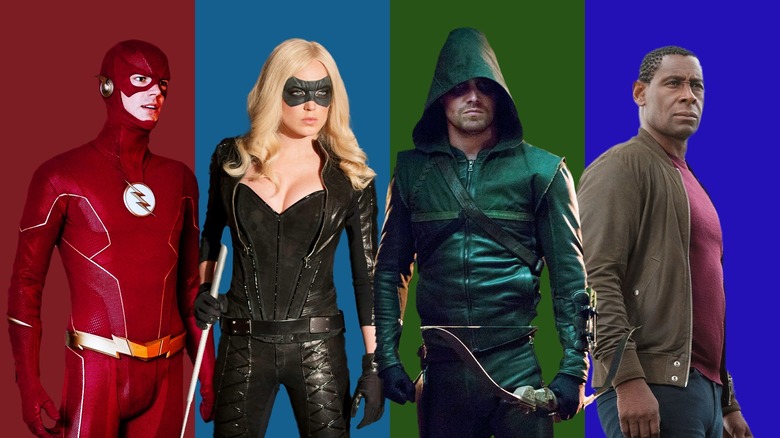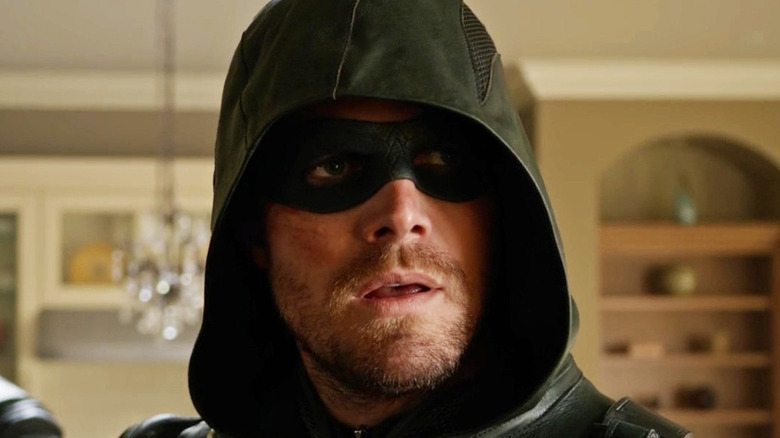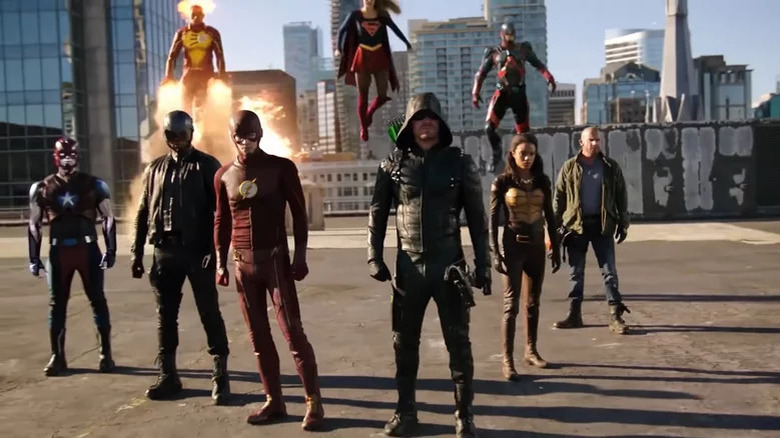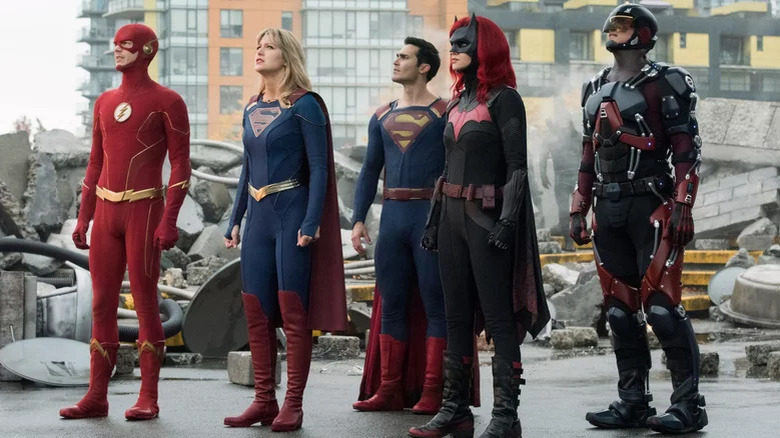The Arrowverse's Long, Agonizing Death Is A Lesson In How To Achieve Cultural Irrelevance
Remember how original and unique "Arrow," "The Flash," and the slew of superhero shows that grew around them were back in the day? When Zach Snyder was still yanking the nascent DCEU's pull cord with "Man of Steel," Oliver Queen (Stephen Amell) was fighting the street-level fight in Starling City, and not too long afterwards, Barry Allen (Grant Gustin) started outrunning supervillains in Central City. The entire timeline of Arrowverse grew into a sprawling small-screen mythology with numerous crossovers and team-ups, and gave many otherwise obscure heroes and villains a massive popularity boost. And then, just like that, the honeymoon was over.
Over the years, the Arrowverse became wallpaper. It was always just ... there, as opposed to the numerous inventive superhero shows and movies competing for the viewers' attention. The shows started ending, one by one. Right now, "The Flash" is the sole Arrowverse show still standing. With Amell's Green Arrow donning his hood one last time in the show's final season, it appears that the Arrowverse is well and truly ending ... and the season needs to deliver a mighty big bang if it hopes to counter the quiet whimper the franchise's slow demise has been so far.
How did The CW's once-influential DC superhero universe manage to become so irrelevant? Let's look at what happened.
Arrowverse couldn't escape the curse of The Walking Dead
Everyone likes ice cream, but you can still drown in it if the tub's big enough. That basic principle also applies to genre shows, which tend to lose their momentum and become stagnant if they run for too long.
Consider "The Walking Dead." You'd be hard pressed to find a zombie joke that hasn't been used to describe AMC's flagship not-zombie show's lumbering, persistent 11-season existence. In all fairness, the parallels are there. "The Walking Dead" survived that damn season on the farm, only to become a shambling parody of itself, infect AMC with a number of lesser spin-offs, and slowly wear out its welcome.
This didn't just change into a rant against "The Walking Dead" all of the sudden. That show is merely the most obvious example of the same problem that has plagued the Arrowverse's later stages. How many evil, creepy-looking speedsters has the Flash clashed with over the years? Shouldn't the Arrowverse just outlaw archery, since it's clear that every single person who's even looked at a bow feels compelled to become a vigilante? How many times have you watched an Arrowverse show and thought, "Sure, that was sort of cool, but haven't we seen this already?"
Even the most alluring genre universes have a shelf life, unless they heavily reinvent and experiment. Arrowverse's attempts to shake things up were never quite enough, and at some point, the sheer amount of content just diluted the experience to the point that it became hard to care anymore.
Arrowverse became stagnant while the competition wasn't afraid to experiment
Arrowverse shows don't quite count as formulaic procedurals. There are constantly bigger arcs in place, and the shows know how to mix and match the villain-of-the-week episodes and season-long storylines. However, comic book adaptations that they are, they're often deliberately episodic in nature, and even their weirdest moments rarely stray too far from The CW adventure drama template that "Smallville" set back in the day — with, of course, the notable exception of the glorious mayhem of "Legends of Tomorrow."
None of this is a problem in itself, because whatever else they were, the Arrowverse shows were still good. However, "good" doesn't quite cut it when the competing company on the other side of the street is busy redefining the genre.
To say that Marvel's Netflix shows –- which have since migrated to Disney+ and are now known as "The Defenders Saga" -– hit the ground running would be a massive understatement. "Daredevil" Season 1 remains one of the most mature superhero stories ever told, complete with a magnificent cast and an all-time great villain in Wilson "Kingpin" Fisk (Vincent D'Onofrio). "Jessica Jones" followed suit with an even more cynical take on superpowered people, as the titular private detective (Krysten Ritter) deals with the manipulative supervillain Kilgrave (David Tennant) and her own traumatic past.
With some exceptions (yeah, "Iron Fist," we're looking at you), the stories Marvel's Netflix series told were more than enough to blow the Arrowverse's more conventional structures and stories out of the water. And that's just Marvel's first trial run — they've since gone all in with the Disney+ MCU shows, while elsewhere, shows like "The Boys" are constantly pushing the boundaries of what a superhero series can do.
Still, Arrowverse did have its own thing going. Its signature style might even have been enough to successfully occupy its own sliver of small screen success indefinitely, if it wasn't for the fact that ...
Warner Bros. always saw Arrowverse as the minor leagues
The Defenders Saga didn't kill the Arrowverse. Losing its momentum after running for too many seasons across various shows hurt it a good deal over time, but there was probably still enough gas in the tank for a few more years. However, there was one problem Arrowverse couldn't escape, no matter how it tried: Warner Bros. always treated it as the minor leagues, forever destined to play second fiddle to the movie universe.
No matter what the Arrowverse has pulled out of its hat, the main live-action Flash remains Ezra Miller, regardless of how much real-life trouble they've gotten in. The Big Three of Superman, Batman, and Wonder Woman have been silver screen franchise players, and whatever version of Supes has deigned to turn up in the Arrowverse has always been rather markedly an inferior alternate-universe version. "'Green Arrow', you say?" the DCEU movies ask with raised eyebrows. "Is that a smoothie of some sort?"
With James Gunn and Peter Safran's extreme DC Universe reboot, Arrowverse would likely have been destined to slide even further down the food chain. As great as The CW shows were at the height of their powers, the audiences can't help but to catch on to the suits' evident "they don't really matter as much as the movies" attitude — especially compared to the folks over at Marvel Studios, who have been busy bringing Netflix-era characters to the MCU proper. Though Arrowverse's demise can ostensibly be chalked down to The CW's shifting priorities, it was clearly on its last legs. Hopefully, the final season of "The Flash" can still muster energy for one last sprint.



